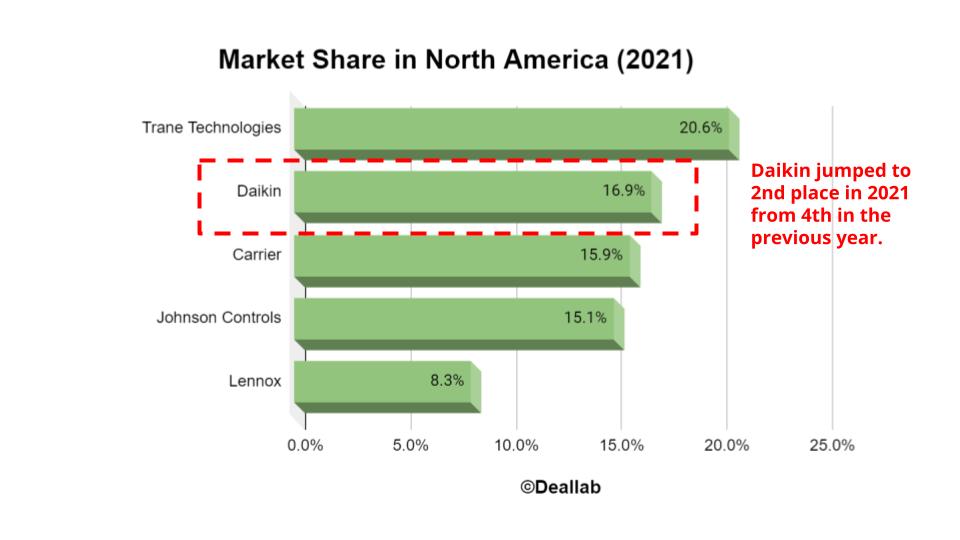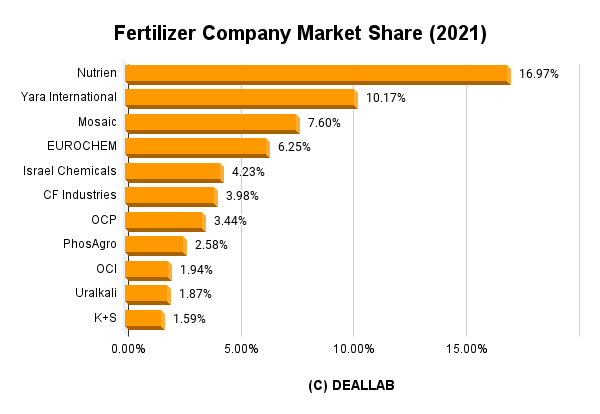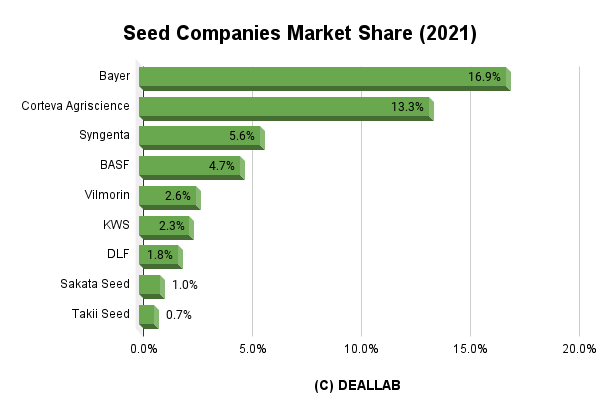This page analyzes the global market share and market size of the automotive parts industry. It also provides a list of the world’s major automotive parts manufacturers, including Denso, Bosch, Continental, Magna International, ZF, and Faurecia.
Market share of the automotive parts industry
A simple calculation of the global market share of the auto parts industry in 2020, using the fiscal 2020 sales of the auto parts companies as the numerator and the market size described below as the denominator, shows that Bosch will come in first with 6.74%, followed by Denso with 6.19%, and Continental with 4.48%. Continental’s share is 4.48%.
Global Market Share of Automotive Parts Industry in 2020
- No.1 BOSCH 6.74%
- No.2 Denso 6.19%
- No.3 Continental 4.48%
- No.4 ZF 4.43%
- No.5 Hyundai Mobis 4.35%
- No.6 Aishin 4.28%
- No.7 Magna International 3.69%
- No.8 Valeo 2.62%
- No.9 Lear Corp 2.27%
- No.10 Yazaki 2.15%
- No.11 Tenneco 2.05%
- No.12 Sumitomo Electric 2.01%
- No.13 Faurecia 1.99%
- No.14 Adient 1.69%
- No.15 Panasonic 1.68%
- No.16 Marelli 1.66%
- No.17 Toyota Boshoku 1.59%
- No.18 Mahle 1.57%
- No.19 BorgWarner 1.36%
- No.20 Hitachi Astemo 1.24%
- No.21 Yanfeng 1.17%
- No.22 Plastic Omnium 1.14%
- No.23 JTEKT 0.98%
- No.24 Toyoda Gosei 0.90%
- No.25 Koito 0.89%
- No.26 Thyssenkrupp 0.75%
- No.27 Mitsubishi Electric 0.75%
- No.28 LG 0.69%
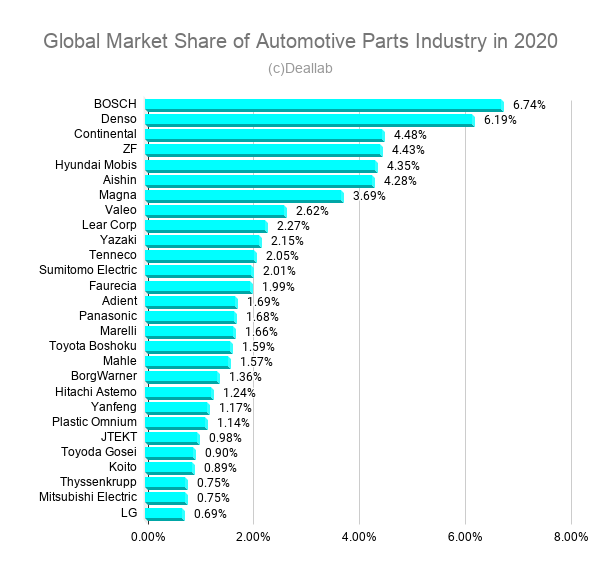
In first place is the German company Bosch. It is one of the leading industrial equipment manufacturers in Germany, and manufactures a wide range of automotive parts, from engines to electronic devices. In third place is the German company Continental. In addition to its tire business, Continental also has strengths in automotive systems such as brake control and car electronics. Unlike Bosch and Continental, Denso has a very strong relationship with Toyota. No. 4 is Germany’s ZF, which is strong in powertrains such as transmissions and chassis, and is accelerating its global expansion with the acquisition of TRW. in the U.S. No. 5 is Hyundai Mobis. No. 4 is Germany’s ZF, which is strong in powertrains such as transmissions and chassis, and is accelerating its global expansion with the acquisition of TRW in the U.S. No. 5 is Hyundai Mobis.In seventh place is Magna, a major Canadian auto parts supplier. It has a strong relationship with U.S. automakers and has strengths in automotive seats and other products.
Market size
Deallab assumes that the global market size of the automotive parts manufacturing industry in 2020 will be 750 billion dollars, the sum of manufacturing and aftermarket. The data referred to is as follows. According to the research firm Persistence Market Research, the market size of the industry in 2019 is $375 billion. According to research firm Grandview Research, the automotive aftermarket market size in 2020 will be $391 billion. It is projected to grow at a CAGR of 3.8% by 2028.
Merger and acquisitions
The automotive industry is a broad industry, and there is a lot of activity in terms of independence from major automotive companies, business integration and M&A in pursuit of scale for technological innovation. The most recent acquisition multiples (sales multiples) are generally less than 1x.
2007 Acquisition of Siemens VDO by Continental
2008 Schaeffler’s acquisition of Continental
2010 Investment fund acquires Tomkins
2011 New Zealand investment fund acquires Honeywell’s auto parts business
2011 Valeo acquires Files in Japan
2011 Nisshinbo acquires Germany’s TMD Friction
2012 Delphi acquires FCI of France
2012 Magna of Canada acquires Ixetic of Germany
2013 Gentex Corporation acquires Johnson Controls’ Homelink business
2014 Continental acquires Veyance Technologies
2014 Investment fund acquires Gates Corporation from Tomkins
2014 ZF and TRW merge
2014 Hankook Tire and investment funds acquire Visteon’s Climate Control business
2015 Mahle acquires Delphi’s Thermal system
2016 Johnson Controls spins off car seat company Adient
2016 Samsung Electronics acquires sound giant Harman
2016 KKR acquires Calsonic Kansei
2017 Delphi Technologies spun off
2018 Teneco acquires Federal Mogul
2018 LG Electronics acquires Austrian lighting giant ZKW
2018 KKR (Calsonic Kansei) acquires Magneti Marelli
2018 Autoliv spins off Veoneer
2018 Garrett Motion spun off from Honeywell
2018 Asahi Kasei acquires leading automotive interior fabric company Sage Automotive Interiors
2019 Clarion acquisition by Faurecia
2020 BorgWarner’s acquisition of Delphi Technologies
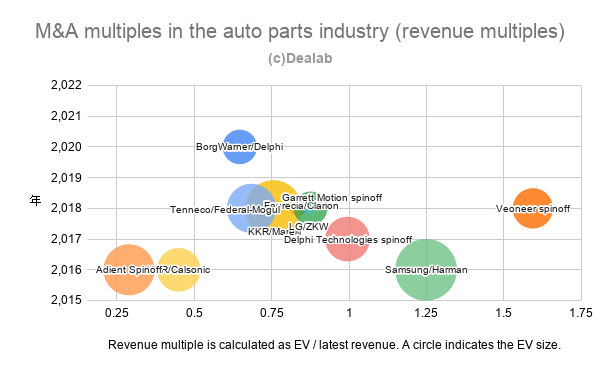
Types of Auto Parts
There are many different types of automotive parts. They include the power unit (engine), the transmission (power train or drive train, transmission, clutches and drive shafts), the framework and driving equipment (body and chassis, suspension, steering, brakes), and other supporting equipment (instruments such as speedometers (instrument panels), infotainment such as car audio, car navigation, and car phones, batteries, wiring harnesses, etc.). Other support devices (instrument panels such as speed meters, infotainment such as car audio, car navigation systems, and car telephones, electrical components such as batteries and wiring harnesses, exhaust gas treatment systems, heating and air conditioning components, steering wheels, automobile lighting, tires, seats, doors, bumpers, etc.) Powertrain is classified into the following categories.
The powertrain is the device that transmits the rotational energy of the engine to the driving wheels. It includes clutches, shafts, transmissions, etc.
Overview of the global automotive parts manufacturers
Continental
Continental, founded in 1871 and based in Hannover, Germany, is a manufacturer of tires, brakes, and other automotive components. In 2008, the Schaeffler family, which owns the German bearing giant Schaeffler, became the controlling shareholder. The company boasts the second largest share of the global market after Michelin, Bridgestone, and Goodyear. It is also one of the world's largest automotive parts manufacturers, rivaling Bosch and Denso in terms of scale. Among automotive components, it has the largest share of the global market in the areas of brakes, powertrain, chassis, instrument panels, car audio and displays.
BOSCH
BOSCH is one of Germany's leading manufacturers of general electrical equipment, with its origins in a precision machinery and electrical engineering workshop founded in Stuttgart in 1886 by Robert Bosch. The company's core business is industrial and automotive equipment, but its power tool business is also traditionally strong. The company is also involved in home appliances and energy-related equipment for the residential sector. It is a privately held company controlled by the Bosch family. It is said to have a close relationship with VW of Germany.
Denso
Denso is one of the largest automotive parts manufacturers in Japan. Toyota Motor Corporation is a major shareholder, and Denso has a deep relationship with the company, jointly developing automotive parts through a Japanese approach to collaboration. The company’s strength lies in automotive electrical components and engine parts.
Magna International
Magna International, founded in 1957, is a Canadian-based automotive parts manufacturer. It has strengths in body exteriors and structures, automotive seats, powertrain, and automotive electrical components, as well as a contract automotive (complete vehicle) manufacturing subsidiary. In 2016, it acquired Getrag, a leading transmission manufacturer in Germany.
ZF
ZF (ZF Friedrichshafen) is a German-based automotive parts manufacturer that was originally founded in 1915 by Count Friedrichshafen to manufacture transmissions for airships (Zahnradfabrik = gear factory). ZF, an acronym for Zahnradfabrik, is the current company name. It is also a privately held company, with the Zeppelin Foundation, famous for its airships, as a controlling shareholder. It has strengths in preventive safety technologies such as transmissions and seatbelts, as well as powertrain-related areas such as suspensions and chassis. In 2014, it acquired TRW, a major U.S. auto parts manufacturer with strengths in powertrain and brakes. In 2019, we acquired WABCO Holdings, Inc. in the U.S., which also strengthened the field of brakes and other collision safety technologies.
Faurecia
Faurecia is a France-based automotive parts manufacturer founded in 1997. It is a group company of Stellantis (ex-PSA Peugeot Citroen). In 2018, Hitachi acquired Clarion, a leading OEM (original equipment manufacturer) car navigation system manufacturer for Nissan, Mazda, Mitsubishi Motor and other automakers.
Hyundai Mobis
Hyundai Mobis is an affiliate parts manufacturer of Hyundai Motor Company based in South Korea. The company is involved in a wide range of fields including body, interior, and airbags.
Valeo
Valeo, founded in 1923, is a leading automotive component manufacturer based in France. It has strengths in the areas of powertrain, air conditioning and electrical components. It has a capital alliance with Japan's Ichikoh Industries in the field of lighting and lamps, and in 2019 established a joint venture in the field of automotive lighting with Cree, an LED lighting company.
Panasonic
Panasonic is one of Japan's leading electronics manufacturers, founded in 1917 by Konosuke Matsushita. It has integrated with Matsushita Electric Works and Sanyo Electric, and has a global presence as a general electronics manufacturer. Appliance (home appliances, air conditioning, audio/visual equipment, batteries, etc., with a 90-year history of selling 200 billion units), Automotive (storage batteries, audio equipment, etc.), Industrial (batteries, motors, etc.), Life Solutions (lighting, water, etc.), Connected Solutions (flight Entertainment, electronic devices for aircraft, surveillance cameras, etc.). In 2022, Panasonic Holdings will be established, and the business units will become independent subsidiaries under the holding company.
Aisin Seiki
Aisin Seiki is an automotive parts manufacturer based in Japan. Toyota is the major shareholder. The company’s strength lies in the field of automatic transmissions.
ThyssenKrupp
ThyssenKrupp is one of Germany's largest heavy industry manufacturers, formed in 1999 through the merger of Krupp, founded in 1811, and Thyssen, founded in 1867. The company has been undergoing structural reforms since the 2010s, and after the collapse of its European steel business merger with Tata Steel, it sold its lucrative elevator business to Advent International in 2019.
BorgWaner
BorgWaner, founded in 1928, is a U.S.-based manufacturer of automotive components. The company is a pioneer in the field of automatic transmissions and other transmissions, and is also strong in the field of turbochargers, which originated from Kühnle, Kopp & Kausch (KKK) in 1899, and supplies to manufacturers such as BMW, Daimler, Fiat Chrysler, Ford, GM, VW, and Volvo. In 2020, it acquired Delphi Technologies, the powertrain-related business spun off from Delphi Automotive. The company develops and manufactures turbochargers, emission systems, thermal systems, gasoline ignition technology, actuators, and fuel injection systems for gasoline and diesel engines.
Tenneco
Tenneco, founded in 1940, is a U.S.-based automotive parts manufacturer with strengths in exhaust systems (clean air) and powertrain components such as pistons. Tenneco acquired Federal-Mogul, a supplier of powertrain, brake, engine, and wiper components to the automotive, marine, and rail industries. The company has a partnership with Teikoku Piston of Japan in the field of pistons.





